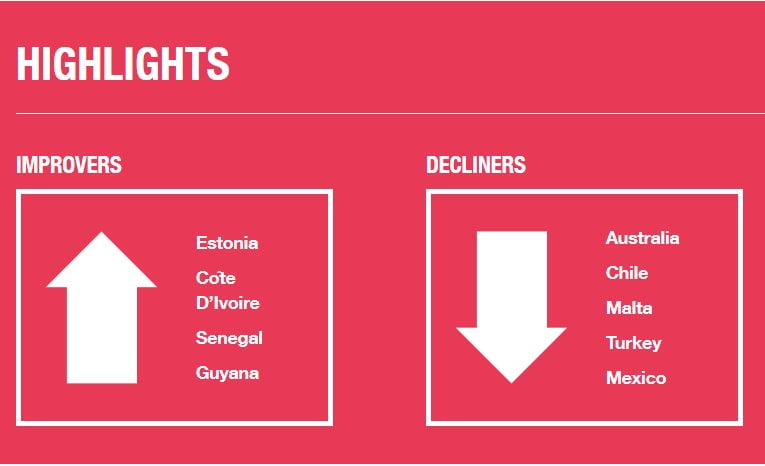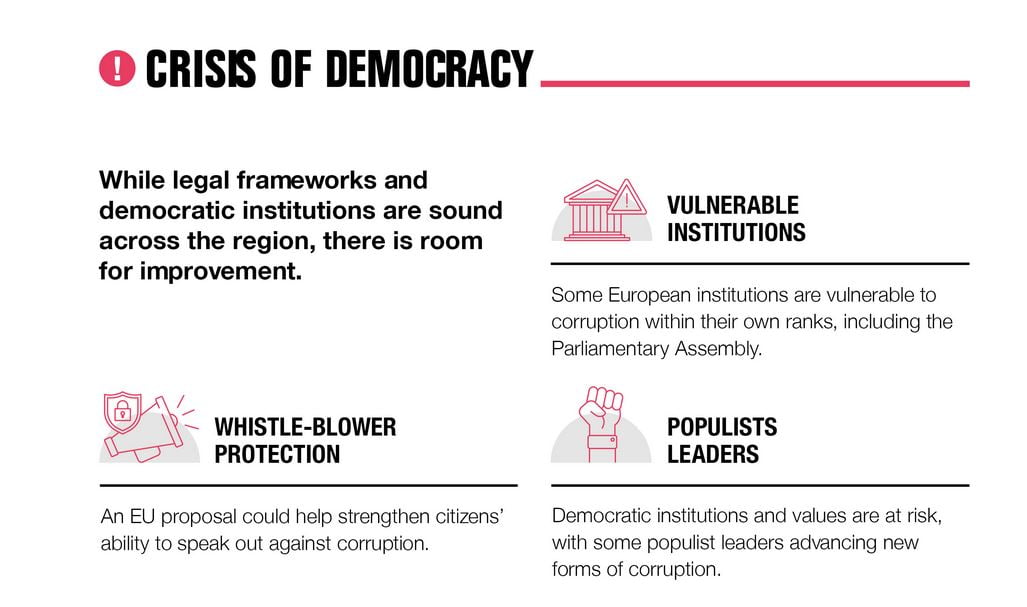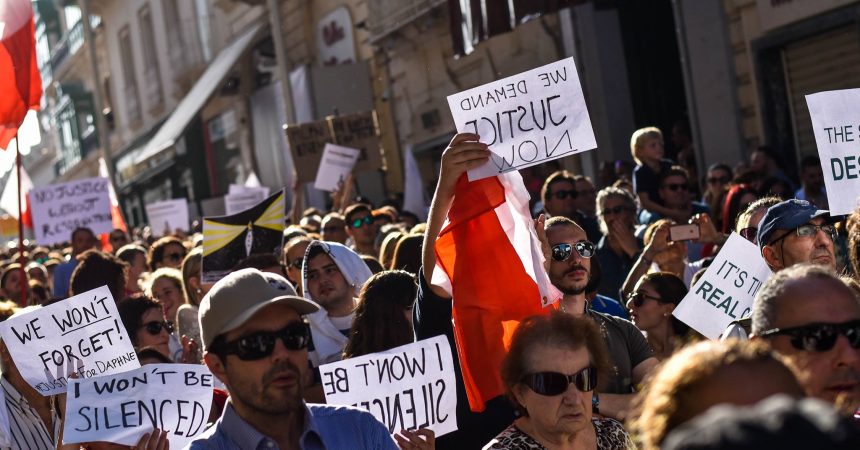Malta is among 16 countries to significantly decrease their score in the Corruption Perceptions Index (CPI) published annually by Transparency International.
Malta decreased by six points over the last three years, moving from 60 in 2015 to 54 in 2018. The CPI states that Hungary and Malta have seen the sharpest decline in their respective CPI scores in recent years, allowing corruption to worsen.
“This significant drop comes as no surprise more than one year after the assassination of journalist Daphne Caruana Galizia, who was killed while reporting on corruption and who posthumously received the 2018 Anti-Corruption Award,” the report states.
The index also refers to the Council of Europe report in December 2018 that concluded there was a serious rule of law problem in Malta’s judiciary and the scandals associated with the highest levels of government.
“Malta is also embroiled in scandals involving the Panama Papers and the collapse of Pilatus bank, as well as its ‘Golden Visa’ scheme, which sells Maltese citizenship to wealthy overseas investors,” the report adds.
This year’s index reveals that the continued failure of most countries to significantly control corruption is contributing to a crisis in democracy around the world.

“Corruption chips away at democracy to produce a vicious cycle, where corruption undermines democratic institutions and, in turn, weak institutions are less able to control corruption”, said Transparency International Managing Director Patricia Moreira.
The index, which ranks 180 countries and territories by their perceived levels of public sector corruption according to experts and businesspeople, uses a scale of 0 to 100, where 0 is highly corrupt and 100 is very clean.
The top countries are Denmark and New Zealand with scores of 88 and 87, respectively. The bottom countries are Somalia, Syria and South Sudan with scores of 10, 13 and 13, respectively.
This year, further research analysis shows a disturbing link between corruption and the health of democracies, where countries with higher rates of corruption also have weaker democratic institutions and political rights.
“Corruption is much more likely to flourish where democratic foundations are weak and, as we have seen in many countries, where undemocratic and populist politicians can use it to their advantage,” said Transparency International Chair Delia Ferreira Rubio.
Western Europe
Fourteen of the top 20 countries on this year’s CPI are from Western Europe and the European Union (EU). With 88 points, Denmark returns as a global leader on the CPI, though its score remains unchanged from last year. In the region, Denmark is closely followed by Finland, Sweden and Switzerland, which each score 85.
At the bottom of the region, Bulgaria scores 42, dropping one point since last year. Bulgaria is followed by Greece (45), which dropped three points since 2017, and Hungary (46), which dropped eight points over the last five years.
While legal frameworks and democratic institutions are sound in many Western European and EU countries, according to the index, there is still significant room for improvement across the region.
While there is an EU legislative proposal to improve protections for whistleblowers, there is a question mark over whether it will be agreed by Member States and ever reach the statute books. Transparency International urges citizens in the region to rally public support for the proposal and strengthen citizens’ ability to speak out against corruption.

“Events of last year revealed how persistent corruption is in Western Europe and the EU, and how some European democratic institutions are exposed to corruption within their own ranks,” the report states referring to an independent report from the Council of Europe confirmed that members of its Parliamentary Assembly were among the beneficiaries of the Azerbaijani Laundromat money laundering scheme, an effort by Azerbaijan to whitewash its international image.
The CPI notes that in the last few years, several countries have also seen a rise in power of political leaders with populist tendencies, working to raise citizens’ fear of targeted groups.
In particular, several countries have harnessed anti-immigration sentiment to promote and justify undemocratic principles. These groups have often used digital platforms that lack transparency, and which are open to interference and abuse by foreign agents, to undermine democratic elections and processes.
“Across Europe, citizens’ trust in democracy has been harmed as a consequence,” according to the CPI.
Recommendations
Stagnation and complacency are not an option for Western Europe and the EU – a region that not only leads, but also sets the bar for other countries that wish to join the EU.
- Enforce the rule of law so that all public powers act within the constraints set out by law, in accordance with the values of democracy and fundamental rights, and under the control of independent and impartial courts.
- Protect whistleblowers so that all citizens can safely report wrongdoing in the public and private spheres.
- Improve legislative transparency and access to information that is required for effective public oversight.
- Ensure a civic space that is safe for civil society to engage in dialogue with governments and authorities without fear of retaliation.
- Protect press freedom and the crucial role that media plays in democracy.
While democratic institutions are in place across the region, political will and enforcement is missing. The CPI stresses that “it is time for countries in Western Europe and the EU to make good on their anti-corruption commitments and live up to their reputation for being a region that is supposed to embody the gold standard of integrity”.













